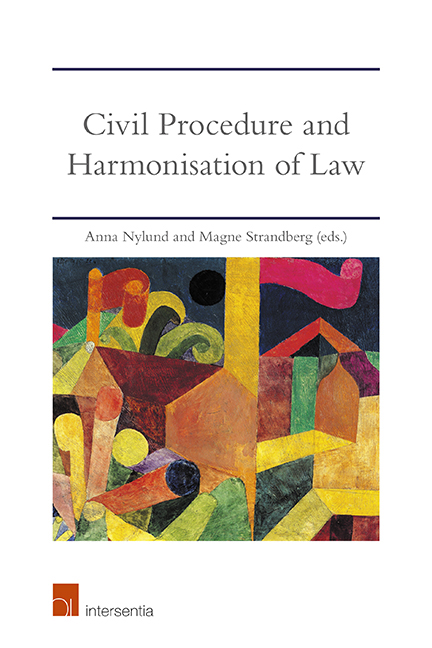Book contents
- Frontmatter
- Preface
- Contents
- List of Contributors
- List of Abbreviations
- Introduction
- EU Civil Justice at the Harmonisation Crossroads?
- The ELI-UNIDROIT Project: An Introduction and an English Perspective
- Europeanisation of Civil Procedure: Overcoming Follow-Up Fragmentation through Bottom-Up Harmonisation?
- Harmonisation or Fragmentation of National Law? An East Nordic Perspective
- An Examination of the Influence of European Union Law on English Civil Procedure
- The EU's Influence on Norwegian Civil Procedure through National Substantive Law
- Consumer Protection and EU-Driven Judicial Activism in the Netherlands
- The Role of the Judge in Consumer Cases – A German Perspective
- Ex Officio Application of the Unfair Terms Directive Cases against Consumers: A Swedish Perspective
- Ex Officio Application of EU Consumer Protection Law in Norwegian Courts
- Maintenance and Multi-Level Harmonisation: A European Union Perspective
- Family Maintenance and Multi-Speed Integration: A Norwegian Perspective
- Conclusions on Civil Procedure and Harmonisation of Law
- About the Editors
An Examination of the Influence of European Union Law on English Civil Procedure
Published online by Cambridge University Press: 30 March 2019
- Frontmatter
- Preface
- Contents
- List of Contributors
- List of Abbreviations
- Introduction
- EU Civil Justice at the Harmonisation Crossroads?
- The ELI-UNIDROIT Project: An Introduction and an English Perspective
- Europeanisation of Civil Procedure: Overcoming Follow-Up Fragmentation through Bottom-Up Harmonisation?
- Harmonisation or Fragmentation of National Law? An East Nordic Perspective
- An Examination of the Influence of European Union Law on English Civil Procedure
- The EU's Influence on Norwegian Civil Procedure through National Substantive Law
- Consumer Protection and EU-Driven Judicial Activism in the Netherlands
- The Role of the Judge in Consumer Cases – A German Perspective
- Ex Officio Application of the Unfair Terms Directive Cases against Consumers: A Swedish Perspective
- Ex Officio Application of EU Consumer Protection Law in Norwegian Courts
- Maintenance and Multi-Level Harmonisation: A European Union Perspective
- Family Maintenance and Multi-Speed Integration: A Norwegian Perspective
- Conclusions on Civil Procedure and Harmonisation of Law
- About the Editors
Summary
INTRODUCTION
Since the United Kingdom joined the European Economic Community in the early 1970s, English and Welsh (English) civil procedure has been subject to significant reform. It underwent radical change, which was described at the time as the most important set of reforms since the 1870s, in the early 1990s as a result of the Civil Justice Review. They were however as nothing compared to reforms implemented less than a decade later. In 1999, as a direct consequence of the Woolf Reforms, English civil procedure saw its two codes of civil procedure replaced by a new, unitary code – the Civil Procedure Rules (the CPR) – applicable to all civil proceedings in all civil courts. While the CPR was understood to be draft ed so as to be consistent with the provisions of the European Convention on Human Rights, specifically its Article 6, the influence of European Union law on both it and its predecessors, and on English procedure in general, has been limited.
Two areas of development are examined here and are illustrative of the absence of significant influence: first, the impact of the European Small Claims Procedure on the comparable English procedure; and secondly, the impact of the European Order for Payment on the manner in which debt claims are dealt with in England. In both cases, the European developments significantly post-date comparable ones in England. And both cases, those European developments have had no real, if any, influence on the English mechanisms. On the contrary, in both cases English and European procedures run parallel within England and no more than that: EU legislation has had no real positive influence in the sense of promoting new developments or revisions to the procedural code. I look at each in turn.
SMALL CLAIMS PROCEDURES
In this section the impact of European Union developments in the areas of small claims, payment orders and mediation is examined. In each case it will be seen that this influence has been, at best, minimal. The reason for this is that these developments arise in areas where English procedure already has a longstanding and well-developed regime, the consequence of which is a blunting of the possibility of influence.
- Type
- Chapter
- Information
- Civil Procedure and Harmonisation of LawThe Dynamics of EU and International Treaties, pp. 99 - 110Publisher: IntersentiaPrint publication year: 2019



